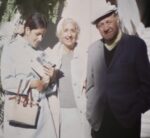
Last week I spent several hours watering grasses. We had planted several thousand tiny grass plugs along the sandy banks of our shore at our bay house to help stabilize the sand. Two days later the sun is intense and the little ones are drying out. My husband Tom got out a huge variety of garden hoses including some borrowed from neighbors and we begin the task of watering each one. “Water each grass twice. The first one is to prepare the plant to drink, the second time is so that the water will be absorbed,” Tom instructs.
Even though it is early morning it is already blazing hot and about an hour into the project Tom points out that the hose nozzle I have been gripping has a lock that will hold it on. Just like when you pump gas for your car! You do not have to hold down the nozzle the whole time. I use the lock and am grateful because my hand was getting cramped and tired. However as we proceed — for another hour — I notice that I can’t seem to remember to stop pressing hard on the trigger, even though it is now locked in place.
I immediately know that I have a metaphor worth writing about! How many things in life do we do with more effort than required! I know for myself: many. For example, on the long drive back to Charlottesville later in the week I notice that I am gripping the steering wheel instead of simply touching it lightly to steer the car. What might we do with this extra effort if we could re-direct it in a useful direction?
Psychiatry professor and author Dan Siegel teaches that our brains act as anticipation machines. It learns from past experience in order to prepare for what is happening next. So our states of mind that develop from our experience and emotions influence the way we direct energy and attention now. He includes our attachment influences that also determine the development of each of our individual temperaments.
My daughter Lanz and I were talking earlier in the week, planning and strategizing for our family gathering — eleven strong — in the next few days. We are both always on! She says, “I had to work to belong. It was not something that was just handed to me in my family.” I know this is the same for me too. I thought belonging was something you had to earn. Oh, the effort we expend! It does help hold the orbit of our family together but is also perhaps more than is really needed. How do we tell our brains that we already belong, that there is a a lock on belonging already set without us putting out all the extra efforts?
When the visit ends and everyone leaves and we have done the many loads of laundry and reclaimed the kitchen as mine again, I notice my whole system feels differently. It is not just that everyone is gone and it is quiet, but my vigilance is gone. I realize that I have been constantly scanning for where everyone is and what everyone is doing the whole time we are together. Even though it makes no difference to the outcome of our time together. EXHAUSTING!
In the class I am taking with Dan Siegel he continues to describe the subcortical networks in our brain. The ones that come on line early in life are all about survival. They have three imperatives; to protect, connect and correct. If in our early experience our protection was threatened we will be more preoccupied with and fear, anxiety. If our connection was threatened we will be more preoccupied by separation distress and sadness. If our sense of right and wrong was threatened we will be more preoccupied with anger and rage, always wanting to correct the situation.
Knowing your particular propensity, you can then work with your state of mind and begin to change it. With attention and intention you can slowly observe your state, with openness and objectivity, without being fully lost in it. This is what I was doing in a small way, saying to myself, “Huh, I am still squeezing the nozzle even though I have the lock on”. My big aha moment in Dan’s class so far is that the various networks in the brain are by nature inhibiting. So if I am in my threat or fear response I cannot feel inside my body or outside my body at the same time. When I am concentrating on being present to my five senses or doing a body scan through my body, I cannot feel my threat response. This is why meditation works to retrain the brain because the more you focus on being present to inside and outside the body, the more you train your brain in that direction. Conversely, the more attention you allow to anxiety about protection, connection, or correction, the more this is your constant preoccupation.
I want to take all the extra energy I expend that is not useful and apply it to being in this moment, absorbing it with all its delicious sights, smells, tastes and sensations, rather than letting my anticipatory brain run the show taking me into some protective mechanism based on a future that has not happened yet and never will. But people can say, ” all that worry and look, it turned out just fine”. And that does not compute to this part of your brain. It is only with moment-to-moment attention and intention that you can re-direct yourself to here and now.
This is re-invigorating my daily practice. I hope it will help you too.
